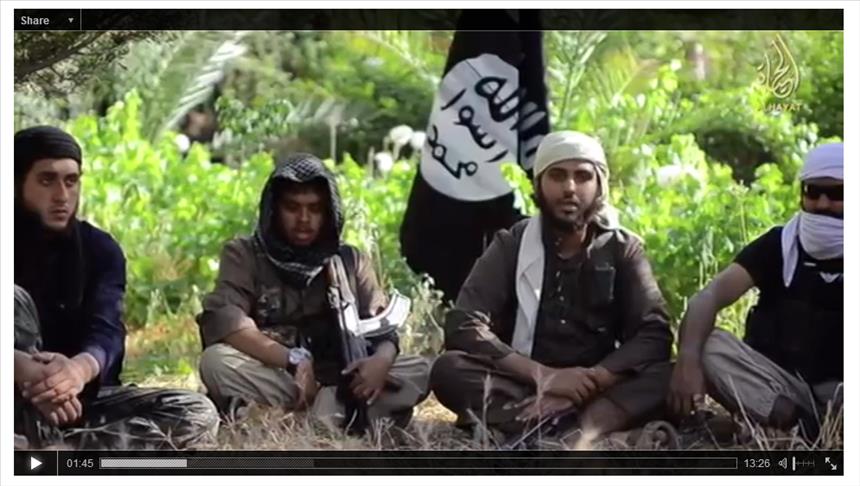
By Kate Bartlett
PHNOM PENH, Cambodia
Members of Cambodia’s minority Muslim community and a head government spokesman strongly denied claims Monday by the Islamic State in Iraq and the Levant (ISIL) that Cambodian jihadis are amongst them.
ISIL -- a militant movement that has taken over large areas of Iraq in the past week -- boasted in a propaganda video Thursday that they had foreign fighters among their ranks, Britons, Australians and - strangely - Cambodians.
"We have brothers from Bangladesh, from Iraq, from Cambodia, Australia, UK," one militant said in the video.
Cambodia has a minority population of about 400,000 people known as Cham Muslims. Their population was largely destroyed in the 1970s under the ultra-Marxist Khmer Rouge regime -- which banned all religion and specifically targeted Cham for genocide.
Today Cham Muslims are a largely impoverished community who live off farming and are not known to be radicalized.
Fairo Vann, of the Cambodia Islamic Association, told the Anadolu Agency that he refused to believe such a thing could happen.
"This isn't true, I don't believe it. I think it's impossible for Cambodian people to go to fight there [Iraq]."
"Cambodian Muslims are very poor, we don't want war, we don't want to fight," he added, noting that Cambodians do not even get involved in religious struggles in neighboring countries with Islamic insurgencies such as Thailand.
Kaylan Sem, director of the Islamic Local Development Organization, agreed by saying, "The Muslim people in Cambodia, they don’t know about Iraq because Iraq is very far. The Muslim people in Cambodia are peaceful."
Many young Cham students receive scholarships to study at madrassas (institutions teaching Islamic principles) in countries such as Saudi Arabia, but government spokesman Phay Siphan told the AA that he did not believe that they were returning radicalized.
"No matter if they go to Saudi Arabia -- they're looking to improve their education, not to fight," he said, noting how Cham had suffered during Cambodia’s own war and saying they were now a people largely committed to tolerance and peace in what is a majority Buddhist country.
Alberto Perez-Pereiro, an anthropologist and specialist in Islam in Cambodia, agreed that the country’s Cham population was not radicalized, but said one could not dismiss outright the possibility of one or more Cambodians having joined ISIL.
"I would say under normal circumstance this is very unlikely," Perez-Pereiro said.
"That said, the guy did mention Cambodia by name," he continued, adding that it would be strange if it were an accident given the likelihood of the video’s makers having ever even heard of Cambodia.
"It could be false but why would you lie about that -- what cache does Cambodia possibly bring to their cause" compared to video boasting of having Western-grown Muslims among their ranks, he said.
"That video's like a United Colors of Benetton ad -- it’s meant to feel global."
Perez-Pereiro stressed that the Cham were fully integrated into Cambodian society, even filling high-ranking government positions -- unlike other countries in the region where there is discrimination against Muslims, such as Myanmar (Burma).
"There's a Cambodian Islam that's perfectly compatible with the rest of the country -- compared to what goes on in Thailand and Burma," he said, adding that Cambodian Muslims had never shown any interest in involvement with Muslim separatist causes such as those in Thailand's south.
"We probably won't know for sure about this Cambodian guy ever," he said. "[But] is it possible? Of course."
The U.S. has expressed concern about the "vulnerability" of the Cham community in the past.
A U.S. embassy cable from 2009 released by the anti-secrecy organization Wikileaks states: "the pressure of extremist Islamic elements -- though more low-key than before -- continues."
In December 2004, Riduan Isamuddin (alias Hambali), the chief of Jemaah Islamiyah -- an al-Qaeda-linked Southeast Asian organization responsible for the 2002 Bali bombings that left over 200 people dead -- was sentenced in absentia to life imprisonment in Cambodia for plotting to bomb the U.S. and British embassies in Phnom Penh.
Hambali was known to have occasionally used Cambodia as a base -- he is now being held in Guantanamo.
Two Thai Muslims and a Cambodian Cham were also sentenced to life for involvement in the plot.
The U.S. Embassy in Phnom Penh declined to comment on the ISIL video.
Anadolu Agency website contains only a portion of the news stories offered to subscribers in the AA News Broadcasting System (HAS), and in summarized form. Please contact us for subscription options.

